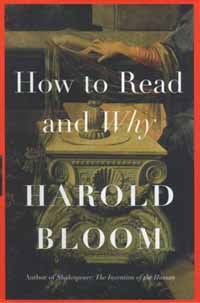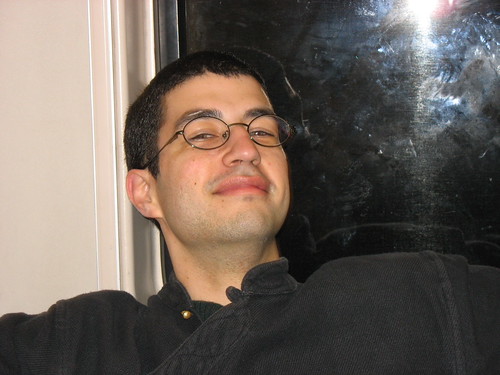
Harold Bloom’s How to read and why.
Begin: 03/5/07
End: 03/07/07
Quality: Ten Out of Ten.
Reason: Random
Genre: Literary Theory.
Original Language: English.
Date of Publication: 2000
Fog Index:15.7/26% are harded.
Flesch Index: 44.5/39% are harder.
Flesch-Kincaid Index: 13/24% are harder.
Complex Words: 15%/48% have more.
Number: Fourth?
I always enjoy Bloom. I think a lot of my enjoyment comes from just contemplating the sheer size of his intellect. I consider myself a fairly intelligent person but then you come across someone look Bloom and you feel so small and puny in comparison. I digress.
How to read and why.
I actually didn’t finish it this time. I only really read and preface and the introduction. The rest of the book is Bloom talking about various novels, short stories, poems, ect. And I wanted to again get a handle on how he felt about reading since I have been doing this book blog lately. I sometimes feel inadequate in writing about literature. This is probably silly considering that I read more than anyone I know and that I am more well-read than anyone I know. Yet, I have this idea in my head of the ideal reader and I have yet to fit the mold. I often feel intellectual inadequate, like I am missing something. Although, Socrates did say that “True wisdom comes to each of us when we realize how little we understand about life, ourselves, and the world around us.” So maybe that somehow means that I am wise?
I digress.
Bloom has a lot of good things to say in this work, a lot. I jotted down some notes and quotes and they are below. I probably should organize them a little but I am not sure that’s going to happen tonight.
There is no single way to read well.
Reading is the most healing of solitary pleasures.
“We read not only because we cannot know enough people, but because friendship is so vulnerable, so likely to diminish or disappear, overcome by space, time, imperfect sympathies, and all the sorrows of familial and passional life.”
Literary criticism should be experiential and pragmatic, never theoretical.
Individuals should read for themselves so they can retain capacity to form their own judgments and opinions.
Reading prepares us for change, especially the final change.
It should be a solitary praxis and not a educational enterprise.
The prime concern should be what comes near to ourselves, what we can put to use.
Sir Francis Bacon “Read not to contradict and confute, not to believe and take for granted, not to find talk and discourse, but to weight and consider.”
Read to strengthen the self and learn its authentic interests.
Reading is selfish activity, not social.
Bloom’s Reading Rules….
1.) Clear your head of cant.
2.) Do not attempt to improve your neighbor nor your neighborhood.
3.) A scholar is a candle which the lover and desire of all men will light.
4.) One must be an inventor to read well.
“We read, frequently if unknowingly, in a quest of a mind more original than our own”
Recovery of the ironic is a necessity, if we are to read well.
Reading is a difficult pleasure.
I would like to write a little on my own at some point about the reasons why I read but that will be sometime in the future. I guess I will leave it off here for now.
Begin: 03/5/07
End: 03/07/07
Quality: Ten Out of Ten.
Reason: Random
Genre: Literary Theory.
Original Language: English.
Date of Publication: 2000
Fog Index:15.7/26% are harded.
Flesch Index: 44.5/39% are harder.
Flesch-Kincaid Index: 13/24% are harder.
Complex Words: 15%/48% have more.
Number: Fourth?
I always enjoy Bloom. I think a lot of my enjoyment comes from just contemplating the sheer size of his intellect. I consider myself a fairly intelligent person but then you come across someone look Bloom and you feel so small and puny in comparison. I digress.
How to read and why.
I actually didn’t finish it this time. I only really read and preface and the introduction. The rest of the book is Bloom talking about various novels, short stories, poems, ect. And I wanted to again get a handle on how he felt about reading since I have been doing this book blog lately. I sometimes feel inadequate in writing about literature. This is probably silly considering that I read more than anyone I know and that I am more well-read than anyone I know. Yet, I have this idea in my head of the ideal reader and I have yet to fit the mold. I often feel intellectual inadequate, like I am missing something. Although, Socrates did say that “True wisdom comes to each of us when we realize how little we understand about life, ourselves, and the world around us.” So maybe that somehow means that I am wise?
I digress.
Bloom has a lot of good things to say in this work, a lot. I jotted down some notes and quotes and they are below. I probably should organize them a little but I am not sure that’s going to happen tonight.
There is no single way to read well.
Reading is the most healing of solitary pleasures.
“We read not only because we cannot know enough people, but because friendship is so vulnerable, so likely to diminish or disappear, overcome by space, time, imperfect sympathies, and all the sorrows of familial and passional life.”
Literary criticism should be experiential and pragmatic, never theoretical.
Individuals should read for themselves so they can retain capacity to form their own judgments and opinions.
Reading prepares us for change, especially the final change.
It should be a solitary praxis and not a educational enterprise.
The prime concern should be what comes near to ourselves, what we can put to use.
Sir Francis Bacon “Read not to contradict and confute, not to believe and take for granted, not to find talk and discourse, but to weight and consider.”
Read to strengthen the self and learn its authentic interests.
Reading is selfish activity, not social.
Bloom’s Reading Rules….
1.) Clear your head of cant.
2.) Do not attempt to improve your neighbor nor your neighborhood.
3.) A scholar is a candle which the lover and desire of all men will light.
4.) One must be an inventor to read well.
“We read, frequently if unknowingly, in a quest of a mind more original than our own”
Recovery of the ironic is a necessity, if we are to read well.
Reading is a difficult pleasure.
I would like to write a little on my own at some point about the reasons why I read but that will be sometime in the future. I guess I will leave it off here for now.

No comments:
Post a Comment